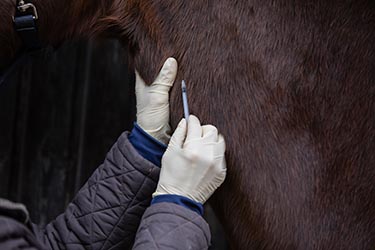Rabies in Horses: What You Need to Know

What You Need to Know About Rabies in Horses: The Deadly Truth
It’s widely known that most small domestic animals (like dogs and cats) are required to get vaccinated for rabies. The AAEP recommends it as a core vaccine in horses as well, due to the considerable public health risks of the disease. The disease is fatal, and annual vaccination is the only form of protection. Most wildlife carrying rabies are more active during spring months, offering a great opportunity to increase compliance with spring vaccinations.
The incidence rate of rabies in horses is nearly four times higher than in dogs, but most horses are not vaccinated annually. According to data from Zoetis, only one of every seven horses in the U.S. is vaccinated against rabies.
What is rabies and how does it affect horses?
Remind your clients that rabies is a deadly virus spread to people from the saliva of infected animals, and horses can absolutely contract and transmit the disease. Once bitten, the virus travels to the brain, where it inevitably causes fatal encephalitis.
It can be challenging to diagnose horses with rabies, as the symptoms vary and often don’t show for an extended period of time. Symptoms of rabies in horses can include:
- Aggressiveness
- Ataxia
- Depression
- Fever
- Incontinence
- Paralysis
- Tremors
In the United States, the most common carriers of the rabies virus include wild animals such as bats, raccoons, skunks and foxes. Typically, horses are not attacked by wild animals carrying the virus, but may get bitten by one that’s wandered into their pasture. Most bites occur on the muzzle, face or lower limbs.
Is rabies dangerous for horses?
Yes, rabies is extremely dangerous for horses. If the horse has been infected and was not vaccinated, the disease will prove to be fatal. It takes anywhere from just three to five days for the horse to die from rabies once their symptoms start to show.
What if the horse has been vaccinated?
If a horse has had the rabies vaccination, but was bitten by an animal or otherwise exposed to the virus, it’s common to recommend a booster vaccination that can help the horse fight off the pathogen. Continued observation of the horse is recommended for the following 45 days.
Be sure your clients are educated on the danger of rabies in unvaccinated horses. Every horse should receive the rabies vaccine as part of their core vaccination schedule every spring.
Visit us online or contact your Covetrus representative at 855.724.3461 to order supplies and medications for your practice.
Sources:
https://aaep.org/guidelines/vaccination-guidelines/core-vaccination-guidelines/rabies
http://www.havahart.com/raccoon-facts, accessed April 30, 2018.
http://www.thebatguy.com/generalbatinfo.html, accessed April 30, 2018.
http://www.havahart.com/skunk-facts, accessed April 30, 2018.
Journal of the American Veterinary Medical Association; April 15, 2018
Data on file, Animalytix, Inc. Equine Vaccine MAT dose sales data 2017-2018, accessed July 23, 2018.
http://www.horsecouncil.org/economics/. Accessed July 23, 2018
https://www.mayoclinic.org/diseases-conditions/rabies/symptoms-causes/syc-20351821
https://aaep.org/guidelines/vaccination-guidelines/core-vaccination-guidelines/rabies
https://equusmagazine.com/diseases/prevent-rabies
Careers
Are you looking for a place to let your talents shine? At Covetrus, we help our practitioner customers better serve their patients and take pride in providing the best customer experience possible. Search our open positions to see our available opportunities.
Newsletter
Stay current with what’s going on with Covetrus, subscribe to receive our newsletter and email communications. Subscribers will receive the latest information in practice management, sales and marketing, animal health, and more.


Leave a comment